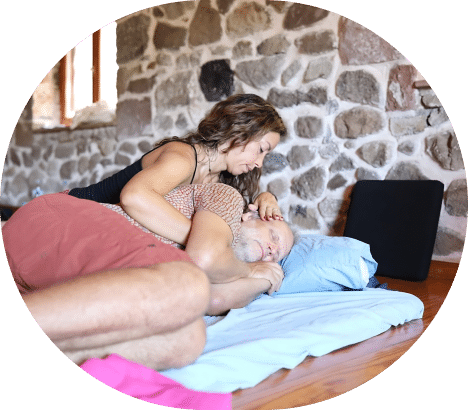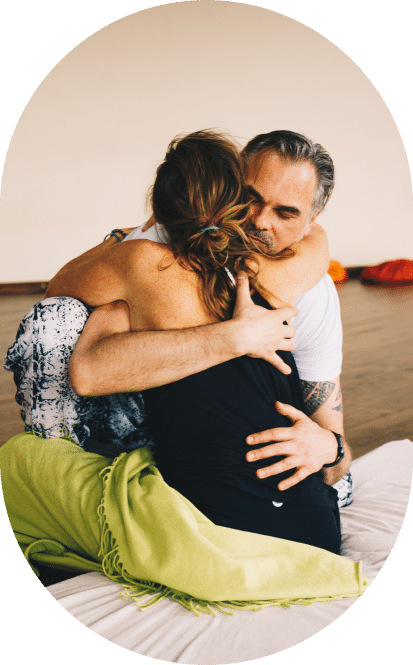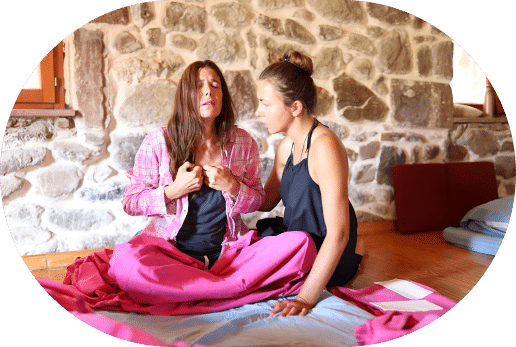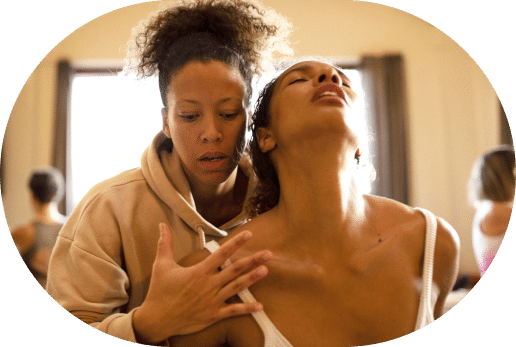Trauma is real. It’s not just an idea, or a feeling of upset. Trauma is a physical reaction that becomes part of our bodies, a response to situations large and small. It builds and settles and takes up residence in our tissues over time, expressing itself in our everyday lives, sometimes for years. Trauma is what happens when our systems become overwhelmed, whether by a specific event or life circumstances. If we cannot adequately process and “clear” these experiences, then our lives can become unmanageable.
In the BioDynamic Breathwork & Trauma Release System® (BBTRS®), we combine successful somatic modalities with five other essential Elements—breathwork, meditation, bodywork, sound, and emotional expression. Together, these allow our natural physiological functions to clean out what was left behind by traumatic events. We trigger the body’s natural “emergency” responses, even when we’re not being chased by a tiger or threatened at gunpoint!


Modulating the breath is known to impact our emotional and physical states; it also changes how our nervous system functions. In BBTRS®, breathwork is used primarily to enhance the process of somatic trauma release, and supports meditation that integrates the work. In general terms, “breathwork” also can describe various breath exercises, and is a method to support the exploration of alternate states of consciousness. All of these assets are key to the practice of BBTRS.
At some point in their lives, most people experience a traumatic event—and about 6 out of every 100 people (or 6% of the U.S. population) will have PTSD.
—National Center for PTSD, U.S. Department of Veteran’s Affairs
Injury and violence affect everyone, regardless of age, race, or economic status. Trauma is the #1 Cause of Death in people ages 1-44.
—National Center for Injury Prevention and Control, a division of the U.S.’s Center for Disease Control.
Exposure to any form of trauma, particularly in childhood, can increase the risk of mental illness and suicide; smoking, alcohol and substance abuse; chronic diseases; and social problems such as poverty, crime, and violence.
—World Health Organization






Common sense should always prevail in determining what modalities you participate in, but we’ve identified a few conditions that are not good matches to the intensity that can come with BBTRS®. Those in the following groups should abstain from BBTRS® entirely:
• People under the influence of recreational drugs or alcohol.
• Pregnant women, especially in the first trimester, as the release associated with deep breathwork should be avoided.
• Those who suffer from asthma, unless it is very mild. (Mild asthma is sometimes improved with BBTRS®; please consult a physician.
• Severe heart disease, epilepsy, or a history of seizures.
• Mental illness, especially schizophrenia, bipolar disorder, borderline personality disorder, and any condition that includes psychosis.
• Severe diabetes, although some people with very mild diabetes, and who are proactive with diet and medication, might tolderate BBTRS®. (Please consult a physician.)
• Acute physical injuries can be exacerbated by some of the autonomic movements in BBTRS®. (Please consult with a physician, physical therapist, or certified BBTRS® facilitator to determine if your level of healing is sufficient to participate.
Want more information about our Bali training or our other locations?
Drop your email below to receive our comprehensive training brochure and stay updated with all the details.
By subscribing, you agree to receive emails from BBTRI®. We only send emails when we have something to say. Your information will be treated with respect and we’ll never share your information. You can unsubscribe at any time.
Meet BBTRS®
Experience BBTRS®
About
Training
Experiential
Resources
Membership
Foundation
Upcoming Workshops
Upcoming Workshops
Upcoming Start Dates:
Upcoming Start Dates:

We and our partners use technology such as cookies on our site to personalize content and ads, provide social media features, and analyze our traffic. Click below to consent to the use of this technology across the web. By clicking below you are giving your consent for our collection of user data that will help us to improve our services and the overall user experience.
For processing change requests, please note that we require a minimum of 30 days’ notice before the booked initial BBTRS training starts.
If you are attending an In-Person training, we strongly suggest you obtain travel insurance to protect against potential changes or regulations related to COVID-19.
In the unlikely event that we must cancel this BBTRS Training, we will refund you the total amount, excluding any currency exchange and bank platform fees incurred.

Please read this Privacy Policy carefully before using this website.
The website and its content is owned by The BioDynamic Breathwork & Trauma Release Institute (“Company”, “we”, or “us”). The term “you” refers to the user or viewer of https://biodynamicbreath.net (“Website”).
This Privacy Policy describes how we collect, use, process and distribute your information, including Personal Data (as defined below) used to access this Website. We will not use or share your information with anyone except as described in this Privacy Policy. The use of information collected through our Sites shall be limited to the purposes under this Privacy Policy and our Terms of Service to customers.
Please read this Privacy Policy carefully. We reserve the right to change this Privacy Policy on the Website at any time without notice. In the event of a material change, we will let you know via email and / or a prominent notice on our Website.
Use of any personal information or contribution that you provide to us, or which is collected by us on or through our Website or its content is governed by this Privacy Policy. By using our Website or its content, you consent to this Privacy Policy, whether or not you have read it.
We collect personal information from you so that we can provide you with a positive experience when utilizing our Website or content. We will only collect the minimum amount of information necessary for us to fulfill our obligation to you. We may collect:
Please note that the information above (“Personal Data”) that you are giving to us is voluntarily, and by you providing this information to us you are giving consent for us to use, collect and process this Personal Data. You are welcome to opt-out or request for us to delete your Personal Data at any point by contacting us at info@biodynamicbreath.net.
If you choose not to provide us with certain Personal Data, you may not be able to participate in certain aspects of our Website or content.
Anonymous Data Collection and Use
To maintain our Website’s high quality, we may use your IP address to help diagnose problems with our server and to administer the Website by identifying which areas of the Website are most heavily used, and to display content according to your preferences. Your IP address is the number assigned to computers connected to the Internet. This is essentially “traffic data” which cannot personally identify you, but is helpful to us for marketing purposes and for improving our services. Traffic data collection does not follow a user’s activities on any other websites in any way. Anonymous traffic data may also be shared with business partners and advertisers on an aggregate basis.
Use of “Cookies”
We may use the standard “cookies” feature of major web browsers. We do not set any personally identifiable information in cookies, nor do we employ any data-capture mechanisms on our Website other than cookies. You may choose to disable cookies through your own web browser’s settings. However, disabling this function may diminish your experience on our Website and some features may not work as intended.
Contact You
We may contact you with information that you provide to us based on these lawful grounds for processing:
Process Payments
We will use the Personal Data you give to us in order to process your payment for the purchase of goods or services under a contract. We only use third party payment processors that take the utmost care in securing data and comply with the GDPR.
Targeted Social Media Advertisements
We may use the data you provide to us to run social media advertisements and / or create look-alike audiences for advertisements.
Share with Third Parties
We may share your information with trusted third parties such as our newsletter provider in order to contact you via email, our merchant accounts to process payments, and Google / social media accounts in order to run advertisements and our affiliates.
Viewing by Others
Note that whenever you voluntarily make your Personal Data available for viewing by others online through this Website or its content, it may be seen, collected and used by others, and therefore, we cannot be responsible for any unauthorized or improper use of the information that you voluntarily share (i.e., sharing a comment on a blog post, posting in a Facebook group that we manage, sharing details on a group coaching call, etc.).
Submission, Storage, Sharing and Transferring of Personal Data
Personal Data that you provide to us is stored internally or through a data management system. Your Personal Data will only be accessed by those who help to obtain, manage or store that information, or who have a legitimate need to know such Personal Data (i.e., our hosting provider, newsletter provider, payment processors or team members).
It is important to note that we may transfer data internationally. For users in the European Union, please be aware that we transfer Personal Data outside of the European Union. By using our Website and providing us with your Personal Data, you consent to these transfers in accordance with this Privacy Policy.
Data Retention
We retain your Personal Data for the minimum amount of time necessary to provide you with the information and / or services that you requested from us. We may include certain Personal Data for longer periods of time if necessary for legal, contractual and accounting obligations.
Confidentiality
We aim to keep the Personal Data that you share with us confidential. Please note that we may disclose such information if required to do so by law or in the good-faith belief that: (1) such action is necessary to protect and defend our rights or property or those of our users or licensees, (2) to act as immediately necessary in order to protect the personal safety or rights of our users or the public, or (3) to investigate or respond to any real or perceived violation of this Privacy Policy or of our Disclaimer, Terms and Conditions, or any other terms of use or agreement with us.
Passwords
To use certain features of the Website or its content, you may need a username and password. You are responsible for maintaining the confidentiality of the username and password, and you are responsible for all activities, whether by you or by others, that occur under your username or password and within your account. We cannot and will not be liable for any loss or damage arising from your failure to protect your username, password or account information. If you share your username or password with others, they may be able to obtain access to your Personal Data at your own risk.
You agree to notify us immediately of any unauthorized or improper use of your username or password or any other breach of security. To help protect against unauthorized or improper use, make sure that you log out at the end of each session requiring your username and password.
We will use our best efforts to keep your username and password(s) private and will not otherwise share your password(s) without your consent, except as necessary when the law requires it or in the good faith belief that such action is necessary, particularly when disclosure is necessary to identify, contact or bring legal action against someone who may be causing injury to others or interfering with our rights or property.
You have the right to:
You may unsubscribe from our e-newsletters or updates at any time through the unsubscribe link at the footer of all email communications. If you have questions or are experiencing problems unsubscribing, please contact us at info@biodynamicbreath.net.
Security
We take commercially reasonable steps to protect the Personal Data you provide to us from misuse, disclosure or unauthorized access. We only share your Personal Data with trusted third parties who use the same level of care in processing your Personal Data. That being said, we cannot guarantee that your Personal Data will always be secure due to technology or security breaches. Should there be a data breach of which we are aware, we will inform you immediately.
Anti-Spam Policy
We have a no spam policy and provide you with the ability to opt-out of our communications by selecting the unsubscribe link at the footer of all e-mails. We have taken the necessary steps to ensure that we are compliant with the CAN-SPAM Act of 2003 by never sending out misleading information. We will not sell, rent or share your email address.
Third Party Websites
We may link to other websites on our Website. We have no responsibility or liability for the content and activities of any other individual, company or entity whose website or materials may be linked to our Website or its content, and thus we cannot be held liable for the privacy of the information on their website or that you voluntarily share with their website. Please review their privacy policies for guidelines as to how they respectively store, use and protect the privacy of your Personal Data.
Children’s Online Privacy Protection Act Compliance
We do not collect any information from anyone under 18 years of age in compliance with COPPA (Children’s Online Privacy Protection Act) and the GDPR (General Data Protection Regulation of the EU). Our Website and its content is directed to individuals who are at least 18 years old or older.
Notification of Changes
We may use your Personal Data, such as your contact information, to inform you of changes to the Website or its content, or, if requested, to send you additional information about us. We reserve the right, at our sole discretion, to change, modify or otherwise alter our Website, its content and this Privacy Policy at any time. Such changes and/or modifications shall become effective immediately upon posting our updated Privacy Policy. Please review this Privacy Policy periodically. Continued use of any of information obtained through or on the Website or its content following the posting of changes and/or modifications constituted acceptance of the revised Privacy Policy. Should there be a material change to our Privacy Policy, we will contact you via email or by a prominent note on our Website.
Data Controller and Processors
We are the data controllers as we are collecting and using your Personal Data. We use trusted third parties as our data processors for technical and organizational purposes, including for payments and email marketing. We use reasonable efforts to make sure our data processors are GDPR- compliant.
Analytics
We may use third-party Service Providers to monitor and analyze the use of our Service.
If you have any questions about this Privacy Policy, please contact us at: info@biodynamicbreath.net
Last Updated: March 6th 2025

Please make sure that you read the full text and that you agree with every detail mentioned here. It is very important that you confirm this agreement before attending any of our events.
By registering, I understand that I am required to maintain the confidentiality and privacy of demo clients and my fellow participant’s attendance regarding anything they’ve shared or processed.
By registering, I agree this will be a safe space of openness where cultural, historical, generational, societal, and personal differences are respected without verbal or physical judgment, criticism, or harm.
By registering, I am aware that recording equipment maybe be present during this workshop. If I ask a question my voice will be recorded and I may appear on video. This video may be posted on the Biodynamic Breathwork and Trauma Release™ website, YouTube, FaceBook, and other media outlets.
If I do not want to appear on video it is my responsibility to inform the course facilitators at the beginning of course. In this case I will not be videoed.
By registering, I understand that I may be presented with the opportunity to participate in a recorded demonstration session in front of the class. I understand that my participation is voluntary. We may pause or discontinue my participation at my discretion or the discretion of BBTRI course facilitator or another Faculty member. I acknowledge that demonstration sessions may include questions about my personal trauma history and/or my emotional and psychological states. My decision to reveal such information is entirely voluntary. I am under no obligation to share anything I do not want to.
II understand that the BioDynamic Breathwork & Trauma Release Workshop & Training can be physically and emotionally intense. By registering, I agree that neither Alexander ‘Giten’ Tonkov, Biodynamic Breathwork and Trauma Release™ Institute, nor any of its staff, coordinators, assistants, faculty members, technicians, affiliates, the venue, or representatives have any responsibility or liability for physical or emotional harm, property loss or damage that may result from attendance at or travel to and from the Workshop and I hereby release them from all claims in connection with my attendance of this workshop.
I acknowledge that I am required to inform the staff about relevant psychiatric history, infectious diseases, drug use, and all present health conditions before participation in the training. I understand that no refunds are provided under any circumstance after the beginning of the workshop. I understand that BioDynamic Breathwork & Trauma Release Institute (BBTRI) Staff reserve the right to request termination of my participation if I have not complied with all of the above guidelines, and/or if BioDynamic Breathwork and Trauma Release Institute’s staff deems it not suitable for me to continue at any point in the workshop.